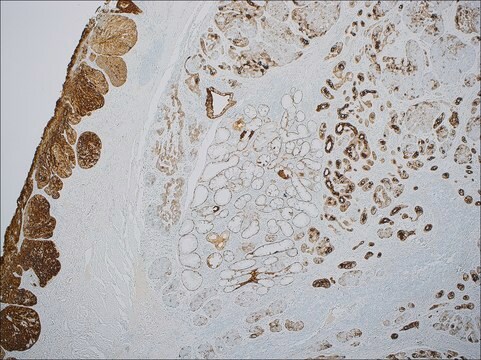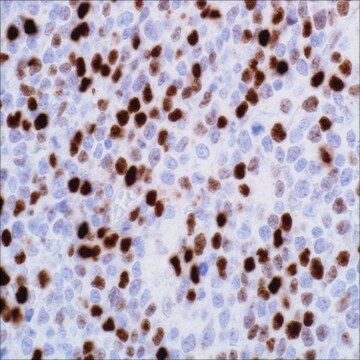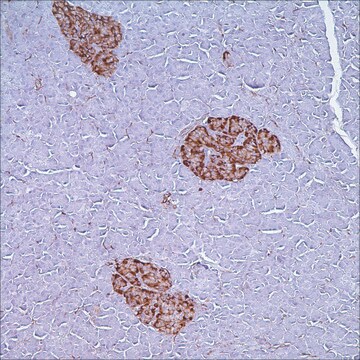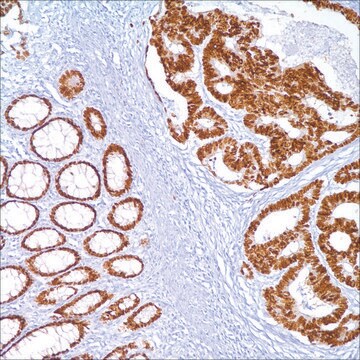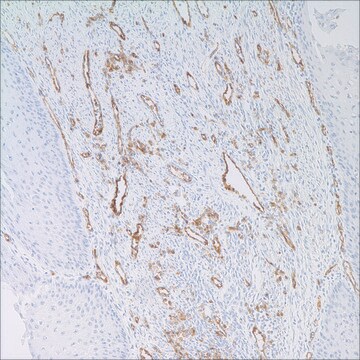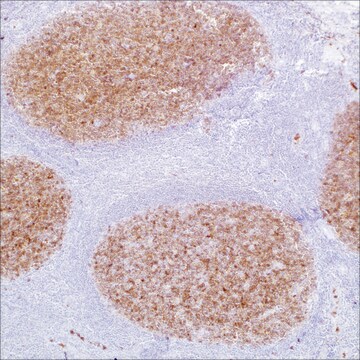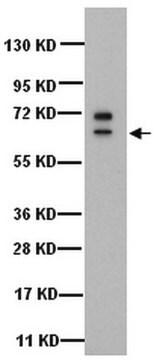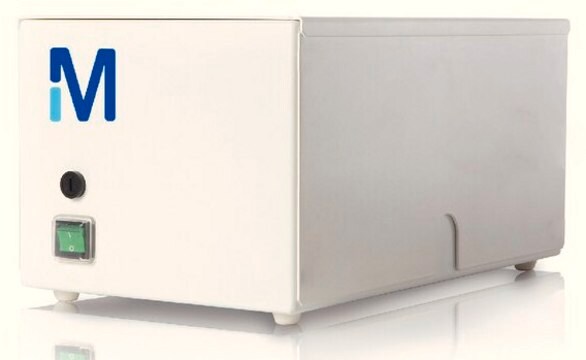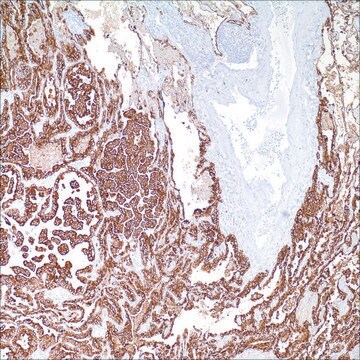推薦產品
生物源
rabbit
品質等級
100
500
共軛
unconjugated
抗體表格
culture supernatant
抗體產品種類
primary antibodies
無性繁殖
EP1601Y, monoclonal
描述
For In Vitro Diagnostic Use in Select Regions (See Chart)
形狀
buffered aqueous solution
物種活性
human
包裝
vial of 0.1 mL concentrate (305R-14)
vial of 0.5 mL concentrate (305R-15)
bottle of 1.0 mL predilute (305R-17)
vial of 1.0 mL concentrate (305R-16)
bottle of 7.0 mL predilute (305R-18)
製造商/商標名
Cell Marque™
技術
immunohistochemistry (formalin-fixed, paraffin-embedded sections): 1:50-1:200
同型
IgG
控制
mesothelioma, prostate
運輸包裝
wet ice
儲存溫度
2-8°C
視覺化
cytoplasmic
基因資訊
human ... KRT5(3852)
一般說明
Cytokeratin 5 is an intermediate filament protein of 58 kD molecular weight within the cytokeratin family. It is a type II (basic) cytokeratin. Antibodies to this protein identify basal cells of squamous and glandular epithelia, myoepithelia, and mesothelium. Anti-cytokeratin 5 has been useful in the differential diagnosis of metastatic carcinoma in the pleura versus epithelioid mesothelioma. Epithelioid mesotheliomas are strongly positive in almost all cases, but up to 11% of pulmonary adenocarinomas will show focal immunoreactivity. Almost all squamous cell carcinomas, half of transitional carcinomas, and many undifferentiated large cell carcinomas immunostain with anti-CK 5. Anti-CK 5, along with anti-p63, affords a high sensitivity and specificity for squamous differentiation. Myoepithelial cells of the breast, glandular epithelia, and basal cells of the prostate are labeled with anti-CK 5. This antibody, along with anti-CK 14, has found application in identifying basal-like breast carcinoma, a tumor with poor prognosis. Some carcinomas of ovarian origin may display anti-CK 5 positivity.
品質
 IVD |  IVD |  IVD |  RUO |
聯結
Cytokeratin 5 Positive Control Slides, Product No. 305S, are available for immunohistochemistry (formalin-fixed, paraffin-embedded sections).
外觀
Solution in Tris Buffer, pH 7.3-7.7, with 1% BSA and <0.1% Sodium Azide
準備報告
Download the IFU specific to your product lot and formatNote: This requires a keycode which can be found on your packaging or product label.
其他說明
For Technical Service please contact: 800-665-7284 or email: service@cellmarque.com
法律資訊
Cell Marque is a trademark of Merck KGaA, Darmstadt, Germany
未找到適合的產品?
試用我們的產品選擇工具.
儲存類別代碼
12 - Non Combustible Liquids
水污染物質分類(WGK)
WGK 2
閃點(°F)
Not applicable
閃點(°C)
Not applicable
分析證明 (COA)
輸入產品批次/批號來搜索 分析證明 (COA)。在產品’s標籤上找到批次和批號,寫有 ‘Lot’或‘Batch’.。
A Douglas-Jones et al.
Histopathology, 47(2), 202-208 (2005-07-28)
To investigate agreement on core biopsy diagnosis of papillary breast lesions, which is acknowledged as a difficult area, and to determine the effect of the use of immunohistochemistry (IHC) to assist diagnosis. Haematoxylin and eosin (H&E) sections of 129 core
Catherine L Clarke et al.
The Journal of pathology, 204(2), 147-152 (2004-09-18)
In recent studies, Böcker and colleagues described a population of cells in paraffin wax sections of normal human breast that express cytokeratins (CK) 5/6 without expression of CK8/18 or smooth muscle actin (SMA). They proposed that these represent stem cells
David J Dabbs et al.
Modern pathology : an official journal of the United States and Canadian Academy of Pathology, Inc, 19(11), 1506-1511 (2006-08-31)
The basal phenotype of breast carcinoma was demonstrated from a study of gene expression profiles, which demonstrated five carcinoma phenotypes with differing immunohistologic profiles and outcomes. The basal phenotype, so-named because of an immunohistologic profile that is similar to myoepithelial
Chad A Livasy et al.
Human pathology, 38(2), 197-204 (2007-01-20)
Microarray profiling of invasive breast carcinomas has identified subtypes including luminal A, luminal B, HER2-overexpressing, and basal-like. The poor-prognosis, basal-like tumors have been immunohistochemically characterized as estrogen receptor (ER)-negative, HER2/neu-negative, and cytokeratin 5/6-positive and/or epidermal growth factor receptor (EGFR)-positive. The
Camilla E Comin et al.
The American journal of surgical pathology, 31(8), 1139-1148 (2007-08-02)
Distinguishing between epithelioid peritoneal mesothelioma and papillary serous carcinomas involving the peritoneum may be very difficult, owing to overlapping morphologic features. Immunohistochemistry may facilitate establishing a correct diagnosis, but, as no single antibody has demonstrated absolute sensitivity and specificity for
我們的科學家團隊在所有研究領域都有豐富的經驗,包括生命科學、材料科學、化學合成、色譜、分析等.
聯絡技術服務